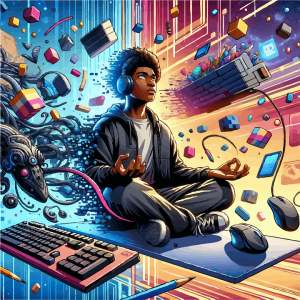The State of Computer Technology in 2025: Trends and Innovations
The world of computer technology is evolving at an unprecedented pace, and 2025 is no exception. From artificial intelligence to quantum computing, the innovations today are reshaping industries, lifestyles, and the way we interact with technology. This article dives into the most impactful advancements in computer technology and the best topics to discuss in today’s tech-driven world.
- Artificial Intelligence and Machine Learning
Artificial Intelligence (AI) has transitioned from being a futuristic concept to an integral part of our daily lives. Machine Learning (ML), a subset of AI, enables computers to learn and adapt without explicit programming. In 2025, AI and ML have seen significant advancements:
- Generative AI Tools: Tools like ChatGPT and MidJourney are revolutionizing content creation, coding, and art by generating human-like text, images, and even videos.
- Healthcare AI: AI is being used for predictive diagnostics, robotic surgery, and personalized treatment plans. Machine learning algorithms analyze vast datasets to detect diseases earlier and more accurately.
- Autonomous Systems: Self-driving cars, drones, and automated manufacturing systems are becoming more sophisticated, relying heavily on real-time AI-powered decision-making.
- Quantum Computing: The Next Frontier
Quantum computing is no longer a distant dream but a burgeoning reality. Unlike classical computers that use bits, quantum computers use quantum bits (qubits), enabling them to process massive amounts of data simultaneously.
- Applications:
- Cryptography: Quantum computers can break traditional encryption, leading to the development of quantum-safe algorithms.
- Drug Discovery: Simulating molecular structures and interactions at a quantum level is accelerating pharmaceutical research.
- Optimization Problems: Industries like logistics and finance benefit from quantum algorithms to solve complex optimization challenges.
While still in its infancy for mainstream use, companies like IBM, Google, and Microsoft are racing to make quantum computing accessible to businesses.
- Cloud Computing and Edge Computing
Cloud computing has become the backbone of modern digital infrastructure. In 2025, it has evolved further, integrating seamlessly with edge computing:
- Hybrid Cloud Solutions: Businesses increasingly adopt hybrid models, combining public and private clouds for better flexibility and control.
- Edge Computing: By processing data closer to the source (e.g., IoT devices), edge computing reduces latency and bandwidth usage. This is critical for applications like autonomous vehicles, smart cities, and real-time analytics.
- Serverless Architectures: Developers are leveraging serverless computing to build scalable applications without worrying about server management.
- The Rise of AI-Powered Chips
As the demand for AI grows, so does the need for specialized hardware. AI-powered chips, such as GPUs, TPUs (Tensor Processing Units), and NPUs (Neural Processing Units), are redefining computational efficiency.
- Custom AI Chips: Companies like NVIDIA, AMD, and Apple are creating chips optimized for AI workloads, ensuring faster and more energy-efficient performance.
- AI in Consumer Electronics: Smartphones, laptops, and wearables now feature AI chips, enabling advanced functionalities like real-time language translation and enhanced camera performance.
- Advances in Human-Computer Interaction (HCI)
The way humans interact with computers has undergone a revolution:
- Voice and Gesture Recognition: Virtual assistants like Siri, Alexa, and Google Assistant are becoming smarter, while gesture-controlled devices add new layers of interactivity.
- Brain-Computer Interfaces (BCIs): Companies like Neuralink are developing BCIs to allow direct communication between the brain and computers, opening possibilities for medical applications and even immersive gaming experiences.
- AR and VR: Augmented Reality (AR) and Virtual Reality (VR) technologies are enhancing experiences in gaming, education, and remote work. Devices like Meta Quest and Microsoft HoloLens are leading the charge.
- Sustainable and Green Computing
Sustainability is a growing priority in the tech industry. Efforts to reduce the environmental impact of computing include:
- Energy-Efficient Data Centers: Companies are investing in cooling technologies and renewable energy to power data centers.
- Recyclable Hardware: Tech giants are designing devices with recyclable materials and modular designs for easier repairs and upgrades.
- Carbon-Neutral Goals: Many organizations aim to achieve carbon neutrality by 2030, focusing on reducing emissions from production and operation.
- The Internet of Things (IoT) Ecosystem
IoT is expanding rapidly, connecting billions of devices to the internet. This interconnected ecosystem enables smarter homes, cities, and industries:
- Smart Homes: IoT devices like thermostats, lights, and security systems are becoming more intuitive, offering seamless integration with AI-powered assistants.
- Industrial IoT (IIoT): Industries use IoT for predictive maintenance, optimizing supply chains, and improving efficiency.
- Security Concerns: As IoT devices proliferate, ensuring data privacy and preventing cyberattacks are critical challenges.
- Cybersecurity Innovations
As technology advances, so do cybersecurity threats. In 2025, cybersecurity innovations are focusing on proactive and adaptive solutions:
- AI-Driven Security: Machine learning algorithms detect and mitigate threats in real-time, offering more robust protection against evolving cyberattacks.
- Zero-Trust Architecture: Businesses are adopting zero-trust frameworks, ensuring that every access request is authenticated and authorized.
- Biometric Authentication: Passwords are increasingly replaced with biometric options like facial recognition and fingerprint scans for enhanced security.
- The Future of Work: Remote and Hybrid Models
The pandemic accelerated the adoption of remote work, and the trend continues in 2025. Computer technology has adapted to support hybrid models:
- Collaboration Tools: Platforms like Microsoft Teams, Zoom, and Slack are enhancing their features to facilitate seamless communication and collaboration.
- Virtual Offices: AR and VR are creating immersive virtual workspaces, mimicking physical office environments.
- Productivity Analytics: AI-driven tools analyze employee productivity to optimize workflows and resource allocation.
- Open-Source and Community-Driven Development
Open-source software continues to thrive, driving innovation and collaboration.
- Community Contributions: Projects like Linux, TensorFlow, and Kubernetes benefit from diverse contributions, accelerating their growth and adoption.
- Open Hardware: Open-source hardware designs are enabling affordable and customizable computing solutions.
- Decentralized Development: Blockchain-based platforms are fostering decentralized app development and hosting.
Best Topic to Discuss: The Role of AI in Everyday Life
If there’s one topic that encapsulates the current state of computer technology, it’s the role of AI in everyday life. AI has permeated nearly every aspect of our existence, from personalized recommendations on streaming platforms to predictive text in emails. Discussing how AI shapes our daily routines, the ethical implications, and its potential for the future provides a comprehensive view of its transformative impact.
Conclusion
The state of computer technology in 2025 is defined by groundbreaking advancements that touch every facet of our lives. From AI and quantum computing to sustainable practices and cybersecurity, these innovations promise to reshape industries and society at large. Whether you’re a tech enthusiast or a professional, staying informed about these trends is essential to navigating the future. With AI at the helm, the possibilities are limitless, and the journey ahead is as exciting as ever.

